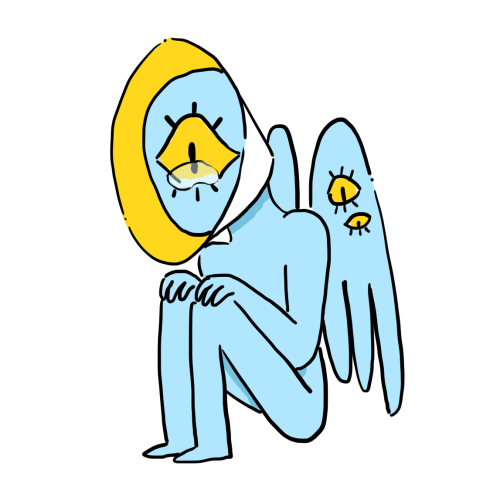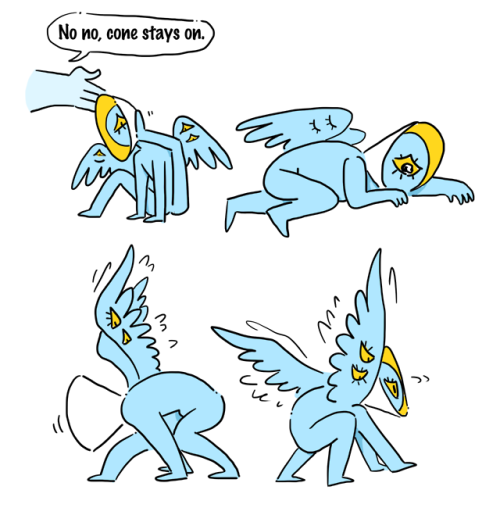*Chefs Kiss*

*Chefs kiss*
Bonus top table reactions:

More Posts from Lauremaster and Others
My chain OC, since it’s about time I finally made one!
Name: Oak.
Human female ranger (the second best ranger, thanks very much), mid 50′s. Face like a gnarled oak, hence the name. Stronger than she looks, and loves to complain. Every time she’s asked, she has a different story about her life before The Chain. Serves in the Advancers, as a scout. Or at least, she did. But right now, she’s making her way from Blackbottom to Capital.
Shout out to @wojtekbc for being a damn pillar of this community. Also @fisyx @xynnos @zarozinia and @hubbleablubble for doing cool featured art.




Types of matter
Here is something you may not know about the moon: Earth’s clingy best friend is also the site of one of the largest-known impact craters in our entire solar system. Essentially, something caused a giant hole on the moon billions of years ago, and astronomers have just discovered that there’s something big – really big – buried underneath the surface.
Need to drill that moon hole.
why you should not dismiss research unless you rly truly mean it
Internet, I am a queer researcher of queer health and I have something to say.
A few weeks back, a study went viral about the relationship between marriage equality policy and queer teen suicide rates, and a lot of people reacted thusly: “queer mental health is better when we’re not discriminated against! BREAKING: SKY IS BLUE, WATER IS WET”
This happens a lot. People see research about a thing ~Everyone Already Knows~ and they mock it. Now I want to make two things really clear:
1. Everyone does not already know.
2. This shit can lose these projects their funding.
Did you know that media coverage is a crucial factor in funding allocation? When we submit our application for grant renewal, we have to provide a list of news articles about our research so they can decide whether the public cares enough about us to let us keep doing our work. And most research doesn’t get all that much coverage, so individual reactions can really matter. If the primary reaction to our publications is eyerolling, we legitimately might not be able to continue.
I’ve seen some frustration from people who believe this research funding would be better put to use “actually helping” the affected populations instead of–I don’t know, pinning them under microscopes or whatever it is they think we do. But funding for policy initiatives is driven by research. I know you wish politicians would listen to individual voices telling them where the problems are, but that’s honestly not a smart way to direct limited resources. We need solid evidence. And a lot of the areas that need the most attention aren’t obvious–who knew bisexual people are at a much higher risk for physical and mental health disparities than gay and lesbian people? Who would have guessed that transgender folks are more likely than any other group (including straight people) to be military veterans, but overwhelmingly don’t claim their benefits? I’m sure some people noticed these patterns, but they definitely weren’t common knowledge within the queer communities I’ve grown up around, and those findings are leading to direct action as we speak.
I get that it can be frustrating to feel like your identity is being reduced to facts and figures for the benefit of red tape. But trust me, the researchers aren’t your enemy here. Most of us are queer too. All of us are just as frustrated by this crap as you are. We are doing our best, and I swear to you this work really is making a difference. Please don’t sabotage it.










All my girls
i’m gonna start showing people this clip and telling them it’s the magnus archives


Medusa with the Head of Perseus, Luciano Garbati, 2008


My cat has to wear a cone this week and it made me think of an angel whose halo is a cone.
I have … a tip.
If you’re writing something that involves an aspect of life that you have not experienced, you obviously have to do research on it. You have to find other examples of it in order to accurately incorporate it into your story realistically.
But don’t just look at professional write ups. Don’t stop at wikepedia or webMD. Look up first person accounts.
I wrote a fic once where a character has frequent seizures. Naturally, I was all over the wikipedia page for seizures, the related pages, other medical websites, etc.
But I also looked at Yahoo asks where people where asking more obscure questions, sometimes asked by people who were experiencing seizures, sometimes answered by people who have had seizures.
I looked to YouTube. Found a few individual videos of people detailing how their seizures usually played out. So found a few channels that were mostly dedicated to displaying the daily habits of someone who was epileptic.
I looked at blogs and articles written by people who have had seizures regularly for as long as they can remember. But I also read the frantic posts from people who were newly diagnosed or had only had one and were worried about another.
When I wrote that fic, I got a comment from someone saying that I had touched upon aspects of movement disorders that they had never seen portrayed in media and that they had found representation in my art that they just never had before. And I think it’s because of the details. The little things.
The wiki page for seizures tells you the technicalities of it all, the terminology. It tells you what can cause them and what the symptoms are. It tells you how to deal with them, how to prevent them.
But it doesn’t tell you how some people with seizures are wary of holding sharp objects or hot liquids. It doesn’t tell you how epileptics feel when they’ve just found out that they’re prone to fits. It doesn’t tell you how their friends and family react to the news.
This applies to any and all writing. And any and all subjects. Disabilities. Sexualities. Ethnicities. Cultures. Professions. Hobbies. Traumas. If you haven’t experienced something first hand, talk to people that have. Listen to people that have. Don’t stop at the scholarly sources. They don’t always have all that you need.
-
 bright-mage liked this · 10 months ago
bright-mage liked this · 10 months ago -
 wanderingbasilisk reblogged this · 10 months ago
wanderingbasilisk reblogged this · 10 months ago -
 atmosphericriver reblogged this · 10 months ago
atmosphericriver reblogged this · 10 months ago -
 vigilante-apologist liked this · 10 months ago
vigilante-apologist liked this · 10 months ago -
 lfleming221-blog liked this · 10 months ago
lfleming221-blog liked this · 10 months ago -
 purplelapislazuli reblogged this · 10 months ago
purplelapislazuli reblogged this · 10 months ago -
 broughttoyoubytotinos liked this · 10 months ago
broughttoyoubytotinos liked this · 10 months ago -
 rosearcanaeum reblogged this · 10 months ago
rosearcanaeum reblogged this · 10 months ago -
 inaccuratefandomhell reblogged this · 10 months ago
inaccuratefandomhell reblogged this · 10 months ago -
 inaccuratefandomhell liked this · 10 months ago
inaccuratefandomhell liked this · 10 months ago -
 little-moonbird liked this · 10 months ago
little-moonbird liked this · 10 months ago -
 cocoawolf reblogged this · 10 months ago
cocoawolf reblogged this · 10 months ago -
 cocoawolf liked this · 10 months ago
cocoawolf liked this · 10 months ago -
 spottedenchants reblogged this · 10 months ago
spottedenchants reblogged this · 10 months ago -
 all-made-of-stardust reblogged this · 10 months ago
all-made-of-stardust reblogged this · 10 months ago -
 junomoons liked this · 10 months ago
junomoons liked this · 10 months ago -
 fixati0ngaze liked this · 10 months ago
fixati0ngaze liked this · 10 months ago -
 catgirlmagneto liked this · 10 months ago
catgirlmagneto liked this · 10 months ago -
 damnedwizards liked this · 10 months ago
damnedwizards liked this · 10 months ago -
 stochastiz liked this · 10 months ago
stochastiz liked this · 10 months ago -
 wanderingbasilisk reblogged this · 10 months ago
wanderingbasilisk reblogged this · 10 months ago -
 wanderingbasilisk liked this · 10 months ago
wanderingbasilisk liked this · 10 months ago -
 rainbowcaleb reblogged this · 10 months ago
rainbowcaleb reblogged this · 10 months ago -
 fairytales-magic liked this · 2 years ago
fairytales-magic liked this · 2 years ago -
 thnks-fr-th-fndms reblogged this · 3 years ago
thnks-fr-th-fndms reblogged this · 3 years ago -
 thnks-fr-th-fndms liked this · 3 years ago
thnks-fr-th-fndms liked this · 3 years ago -
 imaheckincyborg reblogged this · 3 years ago
imaheckincyborg reblogged this · 3 years ago -
 astral-eclipse liked this · 3 years ago
astral-eclipse liked this · 3 years ago -
 captain-buttonbeard liked this · 3 years ago
captain-buttonbeard liked this · 3 years ago -
 milkshake-sprinkels liked this · 3 years ago
milkshake-sprinkels liked this · 3 years ago -
 bumble-lee3 liked this · 4 years ago
bumble-lee3 liked this · 4 years ago -
 butch-ragh-barkrock liked this · 4 years ago
butch-ragh-barkrock liked this · 4 years ago -
 smartbrained liked this · 4 years ago
smartbrained liked this · 4 years ago -
 freinhardt56 liked this · 4 years ago
freinhardt56 liked this · 4 years ago -
 lvlyoasis liked this · 4 years ago
lvlyoasis liked this · 4 years ago -
 palladium-xerox liked this · 4 years ago
palladium-xerox liked this · 4 years ago -
 paperwizards liked this · 4 years ago
paperwizards liked this · 4 years ago -
 tinyshad3s liked this · 4 years ago
tinyshad3s liked this · 4 years ago -
 raptorix liked this · 4 years ago
raptorix liked this · 4 years ago -
 gwacomole liked this · 4 years ago
gwacomole liked this · 4 years ago -
 ruby-leaves liked this · 4 years ago
ruby-leaves liked this · 4 years ago -
 disapointment-backwards-blog liked this · 4 years ago
disapointment-backwards-blog liked this · 4 years ago -
 armykagu liked this · 4 years ago
armykagu liked this · 4 years ago -
 lesbianbitchard-moved liked this · 4 years ago
lesbianbitchard-moved liked this · 4 years ago

